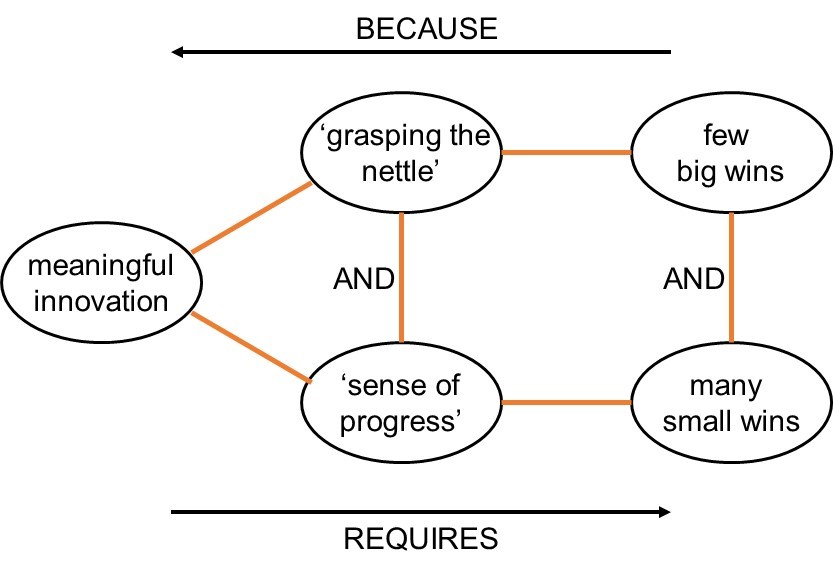“anyone can do any amount of work, provided it isn’t the work he is supposed to be doing at that moment.”
Robert Benchley
Eagle-eyed readers of my ramblings may have noticed an increasingly apparent contradiction. The contradiction exists between two pieces of consistent advice to innovators. One side of the contradiction says, ‘run towards the barriers’, or, put another way, ‘there’s little point working on all the easy problems if you never get past the difficult ones’. This is a piece of advice borne of watching organisations waste literally millions of dollars having project teams skirting around the potential project killers, only to then fail miserably when they can no longer put off the inevitable tackling of the real problem any longer.
The other side of the contradiction is the piece of advice discussing the critical importance of achieving a ‘sense of progress’ within innovation teams. People will keep going on a project when they feel like they’re moving in the right direction. No matter how slowly. The best way to create this sense of progress is to work on problems that are easy to solve, and allow everything to cross something off their job’s list at the end of the day.
So which is right? Quick wins or big wins?
Trick question, right?
No-one wants the either/or answer. Innovation is about solving contradictions, and achieving the both/and solutions. And the reason we spend time drawing pictures like this…
…is it allows us to tap in to the breakthrough solutions that have already been derived by others that have travelled the same road before us.
The generic solutions we can observe from others then need translating into something that works for us as individuals. From a personal perspective, I’ve spent a lot of time in the last couple of years working on my own walking-on-the-shoulders-of-giants solutions to the quick-win/big win conflict.
A lot of it starts from the state of mind I find myself in. Some mornings I wake up thinking I can change the world. Others I have a strong suspicion I’ll be lucky if I manage to get the breakfast cereal from the packet into my bowl. Some days will end up being big win days, and some won’t. The critical thing in the ‘won’t’ days is that you can still nod your head at the end of the day and say to yourself that some kind of progress on something has occurred. Even if it was just a tick in the box marked ‘cereal in bowl’.
One way to tackle the conflict, in other words, is to tailor what you work on during a given day to your prevailing mood. I’ve taken to keeping a pair of jobs lists in recent times, one for all the important, run-towards-the-difficult, ‘big win’ stuff I want to do, and the other for all of the handle-turning grunt work I don’t manage to foist on other people, but that I know needs to be done. The second list is the one designed to allow me a few easy ‘sense of progress’ wins during the day.
It’s a start, but then there’s the procrastination problem. We all have a tendency to procrastinate I think. The trick with procrastination is to allow yourself to procrastinate over some big task without feeling guilty because it meant you didn’t procrastinate over a cluster of lesser tasks. It’s amazing just how much you can get done this way. It all boils down to making the thing you allow yourself to procrastinate over bigger than anything you actually want to get done.
The other reason I allow procrastination is that I’ve learned to stop thinking of it as a bad habit, and started to reframe it as ‘situations where we don’t have enough information to meaningfully solve yet’.
One of the things that working with TRIZ for the last twenty-some years has taught me is that there is no such thing as a problem that can’t be solved. It has given me an absolute – really, absolute – confidence that anything is possible.
In parallel with that, one of the things that working through all of Edward Matchett’s ‘5M’ equation discoveries has taught me is the amazing power of the human brain to make sense of seemingly random clues and ideas. To the extent that, once you’ve piled in the requisite number and quality of inputs, you won’t be able to stop meaningful answers from popping out.
Taken together, I’ve grown in to the habit of piling as much information about a problem I’m working on into my head just before I go to bed or before I head out on a run, knowing that there’s a fairly good chance that, when I wake up in the morning, or get into my running stride, the answer or some important new question will appear. Sometimes it won’t, but mostly it will. Those times it doesn’t, I interpret the lack of progress as a sign that I just haven’t included sufficient clues yet. ‘Creating a ‘sense of progress’ in this situation becomes quite easy: ‘find something new to add to the mix today’.
Rethink your perspective on ‘procrastination’ and pile enough information on enough problems into your head, and I’d be willing to make a fairly safe bet that you’ll have found yourself a highly effective way of ensuring you get a regular supply of big wins, and a daily sense of progress.

